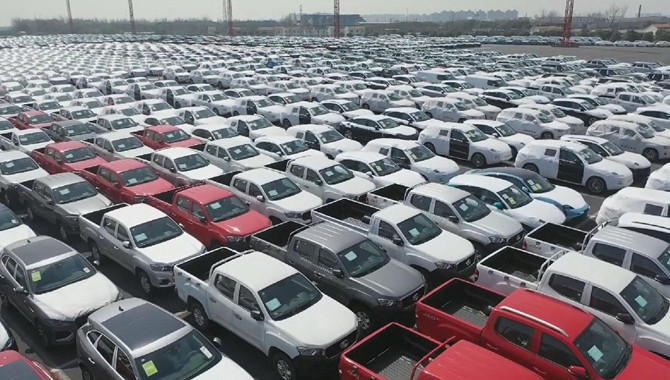
China tops global rankings in the sale of New Electric Vehicles (NEVs) after exporting almost 680,000 new energy vehicles last year, with its NEV production and sales ranking first globally for eight consecutive years.
There are over 20,000 made-in-China cars at the Haitong Automotive Terminal in Shanghai from sedans to large MPVs. A variety of dazzling brands are all about to be exported to overseas markets everyday.
"Our highest daily handling capacity is 17,000 vehicles. Every day on average, this dock at Waigaoqiao receives 3 international vessels, as well as 2 or 3 domestic transport ships," said Cheng Yunbo, Director of Terminal Operation Department of Shanghai Haitong International Automotive Terminal.
"I started driving cars at the port in 2003. At the beginning it was mainly imports but since 2020, I've been driving mostly export cars. There are many domestic brands such as Geely, BYD, Dongfeng Motor, and ChangAn Auto. There are also some international brands such as Tesla, which exports its vehicles made in China," said Wu Ye, technology consultant of Haigang (Shanghai) Automobile RoRo Shipment Service.
Last year, Tesla exported more than 270,000 vehicles from China to overseas markets, accounting for almost 40 percent of the country's total NEV exports. And they were all made in the gigafactory in Shanghai.
"This is the Phase II workshop of the final assembly line. Every 40 seconds a Model Y rolls off this production line," said Xiao Tao, head of Phase II workshop of Tesla Gigafactory Shanghai.
It took just one year from the opening of the Shanghai factory to its first vehicle exported to the European market. Car manufacturers in the factory now export to Japan, Australia, New Zealand and Singapore.
Data from the China Association of Automobile Manufacturers show that during the first 11 months last year, Belgium, the UK, the Philippines, the United Arab Emirates and Australia were the hottest export destinations for Chinese NEVs.
"Nowadays, even the oil countries are thinking of the low carbon strategy, they want to boom the needs of electric vehicles in the local market. And Europe also brings quite a lot of this kind of incentive strategy to support EVs. In the last 2 or 3 years every country experienced supply lackage, but only China can provide equal quality and attractive products," said Zhang Junyi, partner of Oliver Wyman.
With the European Union's plans to end the sale of polluting vehicles by 2035, EV makers have been quick to enter the market.
"Electrification of the auto industry is a global trend. So we are taking full advantage of this window to enter Europe, the home of automobiles, especially Germany, where there are many well-known high-end luxury car brands. It will take a long time for us to become established with consumers," said Chris Chen, managing director of Europe Business of NIO.
Chris said they are working to build an entire infrastructure, including a whole ecosystem for customer service to win the consumers.
The brand has now opened two flagship stores in Europe, one in Germany and another in Norway. But Europe is far from the only overseas market for made-in-China NEVs.
"Cars made in China are increasingly of better quality. They now offer a better driving experience, they look nicer, and they're more comfortable. Great improvement," said Wu.
China's auto exports have been growing exponentially. In 2021, car exports exceeded 2 million units and another 1 million units were added just one year later. Among them, NEVs have been a key driving force, with the proportion growing significantly.
Faced with the increasing demand, they're even having to build a new auto parking area at the shipping terminal in Shanghai's Waigaoqiao area. Once completed, it will add another 6,000 parking spaces for China's NEV's, all headed to buyers around the world.
Source: CCTV
The opinions expressed herein are the author's and not necessarily those of The Xinde Marine News.
Please Contact Us at:
media@xindemarine.com


 Ningbo Containerized Freight Index Weekly Commentar
Ningbo Containerized Freight Index Weekly Commentar  Ningbo Containerized Freight Index Weekly Commentar
Ningbo Containerized Freight Index Weekly Commentar  Ningbo Containerized Freight Index Weekly Commentar
Ningbo Containerized Freight Index Weekly Commentar  BIMCO Shipping Number of the Week: Bulker newbuildi
BIMCO Shipping Number of the Week: Bulker newbuildi  Ningbo Containerized Freight Index Weekly Commentar
Ningbo Containerized Freight Index Weekly Commentar  Ningbo Containerized Freight Index Weekly Commentar
Ningbo Containerized Freight Index Weekly Commentar